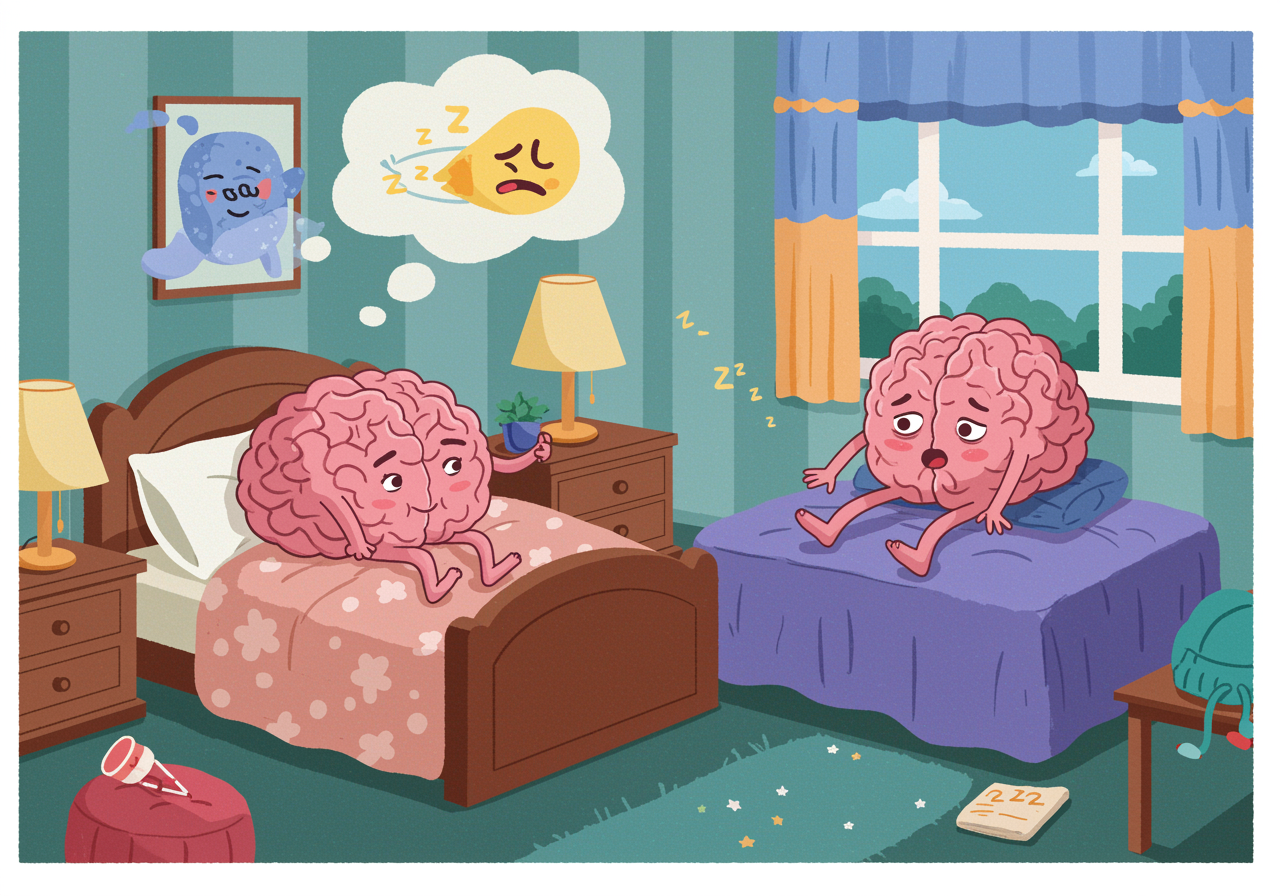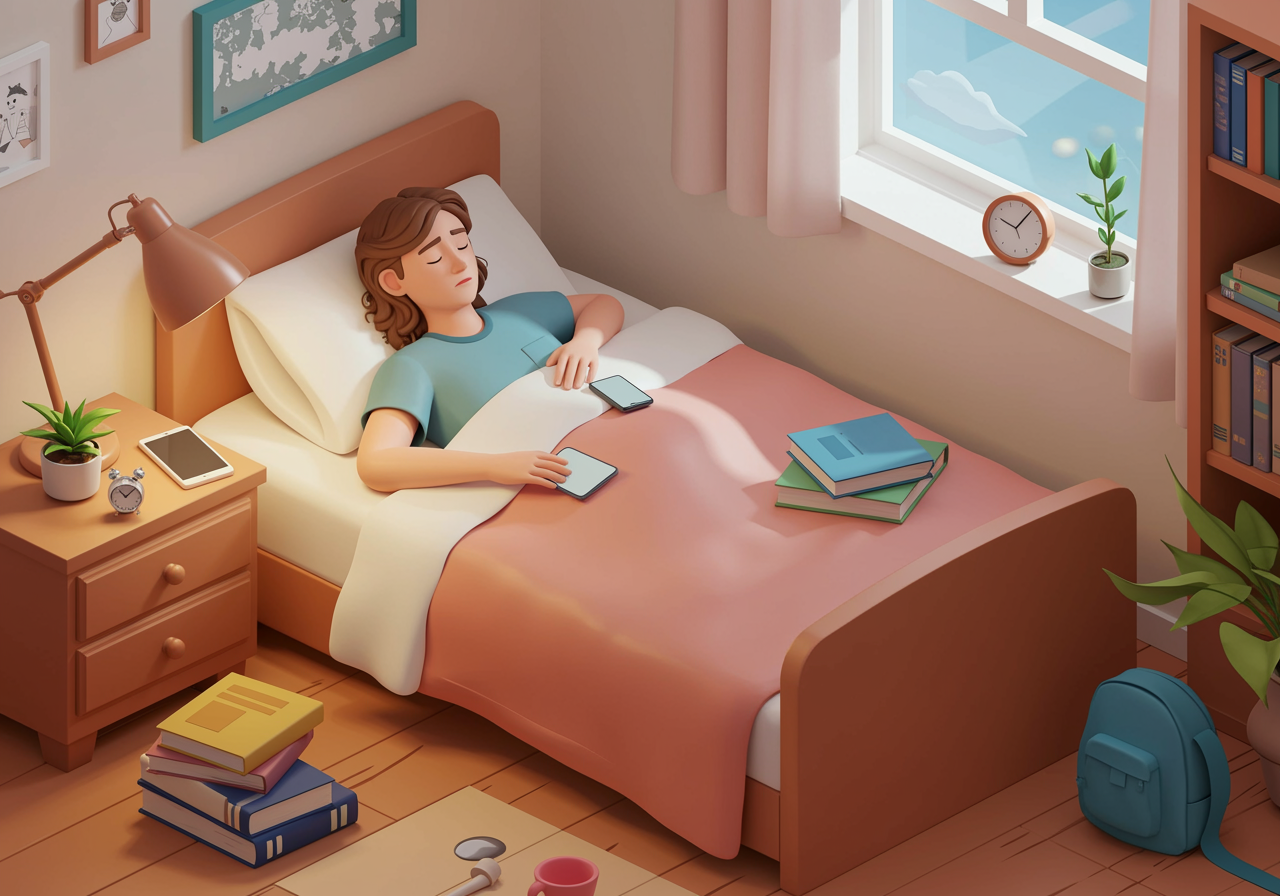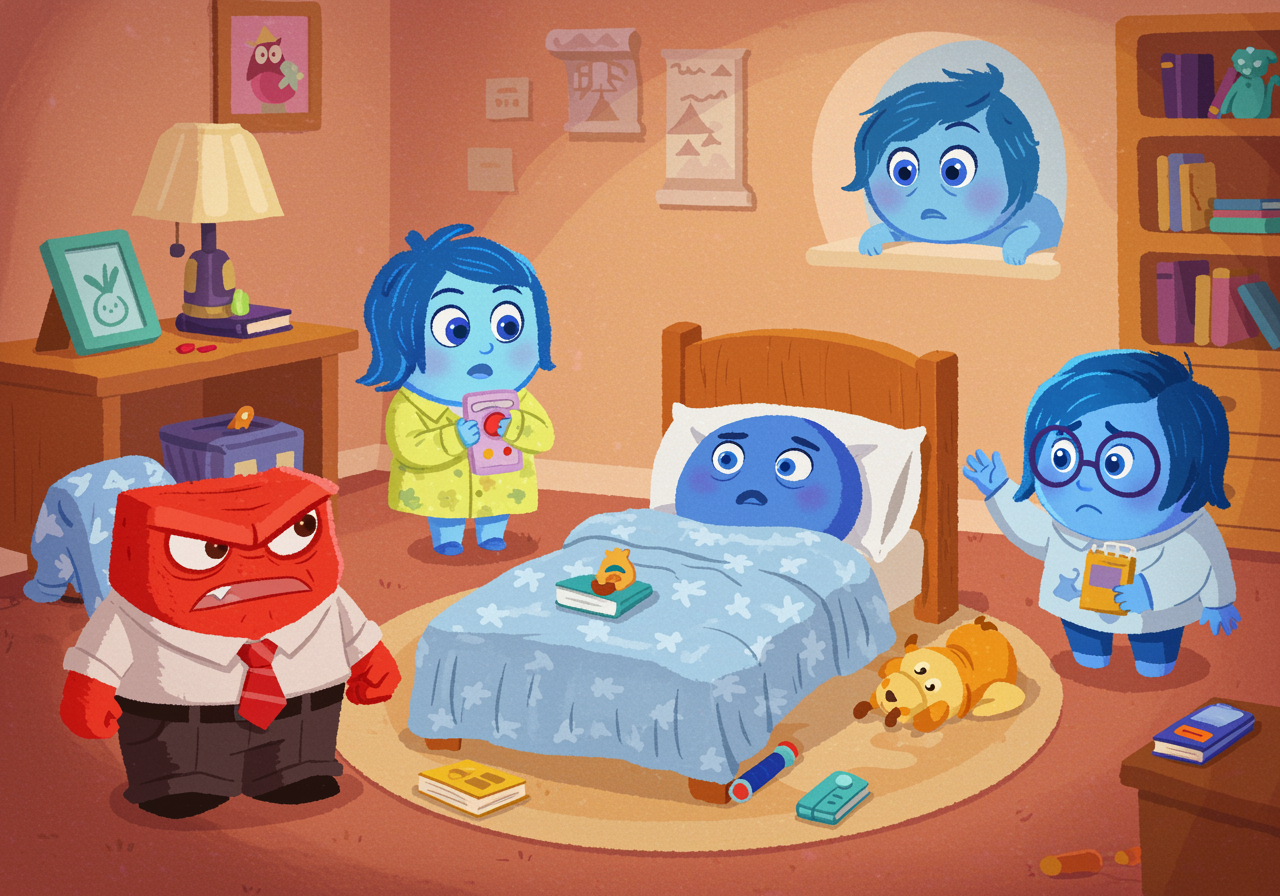Sleep and Your Mind: The Amazing Nighttime Reset Button

Why your brain’s bedtime routine is just as important as your morning one
Discover how your sleep and feelings work together like best friends – and what happens when they’re not getting along.
Overview
Think about the last time you had a terrible night's sleep – everything felt harder the next day, right? That's because your brain and your emotions are like dance partners, and sleep is their practice time. When teens don't get quality sleep, it's like trying to use a phone with a battery that never fully charges. Understanding this connection helps families talk about why bedtime isn't just about rules – it's about taking care of your mind and feelings.

Understand in 30 Seconds
Get up to speed quickly
- Your Brain's Cleanup Crew: While you sleep, your brain literally cleans itself, washing away stress chemicals and organizing memories like a super-efficient janitor.
- Emotion Regulation Station: Sleep helps your brain practice handling big feelings, so you wake up better equipped to deal with drama, stress, and daily challenges.
- The Stress Spiral: When you're stressed or anxious, it's harder to fall asleep, which makes you more stressed the next day – creating a frustrating loop.
- Memory Magic: Good sleep helps turn your daily experiences into long-term memories and helps you learn better, making school and life easier.
Real Life Scenario
Situations you can relate to
Imagine your brain is like a smartphone. During the day, you're constantly opening apps – texting friends, solving math problems, dealing with social drama, remembering homework. By evening, your phone is running slowly and the battery is dying. That's what happens to your brain! Sleep is like plugging your phone in overnight and letting it update, clear the cache, and organize all your photos. Without enough quality sleep, your mental 'phone' starts glitching – you might feel cranky, have trouble focusing, or find yourself getting upset over small things. Have you ever noticed how everything seems more dramatic and overwhelming when you're tired? That's your brain running on low battery, trying to process emotions without its full power.

Role Play
Spark a conversation with “what if” scenarios
What if you could interview your brain after a good night's sleep versus a bad night?
- Role play: Take turns being the 'well-rested brain' (confident, clear, happy) and the 'tired brain' (grumpy, forgetful, dramatic) answering questions about handling a tough day at school.
What if sleep was a superhero and stress was the villain?
- Role play: Act out different scenarios where 'Captain Sleep' battles 'Stress Monster' – show how good sleep habits can defeat worry and anxiety.
What if your emotions had their own bedtime routine?
- Role play: Pretend different emotions (Anger, Worry, Excitement, Sadness) are getting ready for bed – what would each one need to calm down and rest?
FAQs
Frequently asked questions people want to know
Why do I always feel more emotional when I'm tired?
Your brain's emotion control center (the prefrontal cortex) gets weak when you're sleep-deprived, while your emotion reaction center (amygdala) gets hyperactive – like having weak brakes and a sensitive gas pedal on your feelings.
Can anxiety really keep me awake, or am I just making excuses?
Anxiety absolutely affects sleep! When you're worried, your brain releases stress hormones that are designed to keep you alert and ready for danger – the opposite of what you need for sleep.
How much sleep do teens actually need?
Most teens need 8-10 hours of sleep per night, and their natural body clock shifts later during adolescence, making it harder to fall asleep early and wake up early.
Examples in the Wild
See how this works day to day
- A 2023 study found that teens who got less than 7 hours of sleep were 70% more likely to experience depression symptoms compared to those who got 8+ hours. (Journal of Clinical Medicine)
- Research shows that one night of poor sleep can increase anxiety levels by up to 30% the next day, affecting decision-making and emotional responses. (Nature Human Behaviour)
- High school students who start school later (after 8:30 AM) show improved mental health, better grades, and fewer car accidents due to better sleep alignment with teen circadian rhythms. (American Academy of Sleep Medicine)
- During the pandemic, teens experienced a 43% increase in sleep problems, directly correlating with increased rates of anxiety and depression. (Sleep Medicine Reviews)
In Summary
What you should know before you start
- Sleep and mental health work together like teammates – when one struggles, the other does too
- Your brain uses sleep time to clean out stress chemicals and organize emotions
- Poor sleep makes it harder to handle daily stress and big feelings
- Good sleep habits can actually help prevent and reduce anxiety and depression
Pro-tip for Parents
You got this!
If your teen resists bedtime conversations, try talking about sleep during car rides or while doing activities together. Avoid making it feel like a lecture by sharing your own sleep struggles and asking genuine questions about their experiences. Remember, teens' brains are naturally wired to stay up later, so work together to find realistic solutions rather than just enforcing arbitrary bedtimes.

Keep an Eye Out For
Find these examples in everyday life
- News stories about school start times and teen mental health – great conversation starters about sleep policy
- When your teen has a particularly stressful week (tests, social drama, sports) – perfect time to connect sleep quality to their emotional experience
- Mental Health Awareness Month (May) and Sleep Awareness Week (March) – opportunities to revisit these conversations
Explore Beyond
Look up these related research topics
- How screen time and blue light affect both sleep and mood
- The science of dreams and what they might mean for processing emotions
- How exercise and nutrition also impact the sleep-mental health connection